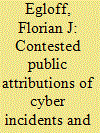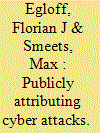|
|
|
Sort Order |
|
|
|
Items / Page
|
|
|
|
|
|
|
| Srl | Item |
| 1 |
ID:
190905


|
|
|
|
|
| Summary/Abstract |
Transformations in state violence are intimately associated with technological capacity. Like previous era-defining technologies, global digital networks have changed state violence. Offensive cyber capabilities (OCCs) appear to constitute a major technological development that offers the potential for reducing state violence. This article asks: are OCCs really the better angels of our digital nature? Current scholarship in strategic studies, adopting a narrow definition of violence, conceives of OCCs as largely non-violent. This ignores how technology has given rise to new forms of harm to individuals and communities, particularly in the context of violent state repression. We propose using an expanded definition of violence, including affective and community harms, and argue that OCCs relocate, rather than reduce, state violence towards non-bodily harms. Even though their lethal effects are limited, OCCs are not, as is supposed, a non-violent addition to state arsenals. This conclusion has important implications for international affairs, including re-orienting defensive cybersecurity efforts and altering calculations around the perception of OCCs by adversaries.
|
|
|
|
|
|
|
|
|
|
|
|
|
|
|
|
| 2 |
ID:
171962


|
|
|
|
|
| Summary/Abstract |
Public attributions of cyber incidents by governments and private industry have become prevalent in recent years. This article argues that they display a skewed version of cyber conflict for several operational and structural reasons, including political, commercial, and legal constraints. In addition, public attribution of cyber incidents takes place in a heavily contested information environment, creating fractured narratives of a shared past. The article uses three cyber incidents (Sony Pictures, DNC, and NotPetya) to show how actors cope with this contested information environment and proposes a changed role of academia to address some of the problems that emerge. To become competent in contesting public attribution discourses, universities would have to work more across physical, disciplinary, and academic boundaries. The main implications for democracies are to be more transparent about how attribution is performed, enable other civilian actors to study cyber conflict, and thereby broaden the discourse on cybersecurity politics.
|
|
|
|
|
|
|
|
|
|
|
|
|
|
|
|
| 3 |
ID:
190772


|
|
|
|
|
| Summary/Abstract |
When should states publicly attribute cyber intrusions? Whilst this is a question governments increasingly grapple with, academia has hardly helped in providing answers. This article describes the stages of public attribution and provides a Public Attribution Framework designed to explain, guide, and improve decision making of public attribution by states. Our general argument is that public attribution is a highly complex process which requires trade-offs of multiple considerations. Effective public attribution not only necessitates a clear understanding of the attributed cyber operation and the cyber threat actor, but also the broader geopolitical environment, allied positions and activities, and the legal context. This also implies that more public attribution is not always better. Public attribution carries significant risks, which are often badly understood. We propose the decision maker’s attitude towards public attribution should be one of ‘strategic, coordinated pragmatism’. Public attribution – as part of a strategy – can only be successful if there is a consistent goal, whilst the avenues for potential negative counter effects are assessed on a case-by-case basis.
|
|
|
|
|
|
|
|
|
|
|
|
|
|
|
|
|
|
|
|
|